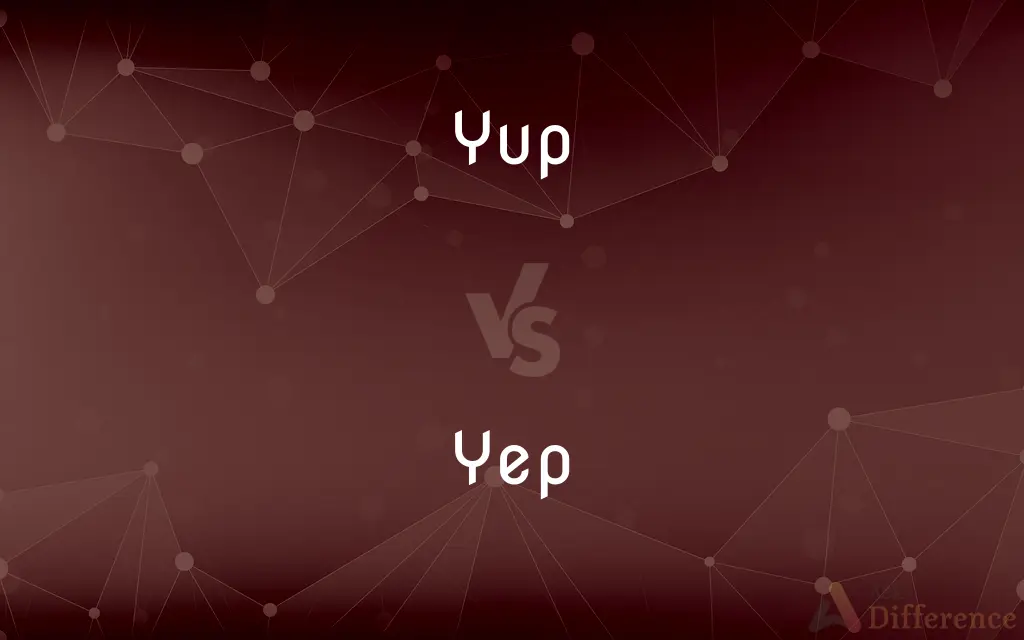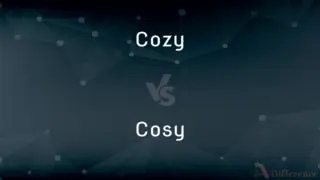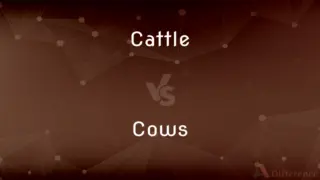Yup vs. Yep — What's the Difference?
By Maham Liaqat & Urooj Arif — Updated on March 20, 2024
Yup and Yep are informal affirmatives, with "Yup" feeling slightly more emphatic or definitive, whereas "Yep" is more casual and universally recognized.

Difference Between Yup and Yep
Table of Contents
ADVERTISEMENT
Key Differences
Yup is often used to express agreement or affirmation in a conversation, conveying a sense of strong confirmation or approval. On the other hand, Yep serves a similar purpose but tends to be perceived as slightly less forceful, often used in casual or informal settings to indicate agreement.
While Yup might be preferred in contexts where a person wants to give a quick, impactful yes, Yep is frequently chosen for its easy, laid-back tone, making it suitable for a wide range of casual interactions.
Yup can also carry a subtle tone of enthusiasm or commitment to the affirmative response it represents. Whereas Yep, while still positive, often lacks this additional layer of enthusiasm, presenting a straightforward acknowledgment.
In certain dialects or personal speech patterns, Yup may be used distinctively to reflect individual identity or regional linguistic preferences. On the other hand, Yep is widely recognized and used across various English-speaking communities, making it a more universally understood form of agreement.
Although both terms are considered informal and colloquial, the choice between Yup and Yep can subtly influence the tone and perception of a conversation. While Yup might be seen as slightly more emphatic, Yep is often used for its neutrality and simplicity.
ADVERTISEMENT
Comparison Chart
Formality
Informal
Informal
Tone
Slightly more emphatic or definitive
Casual and neutral
Perception of Strength
Considered slightly stronger in agreement
Perceived as a lighter form of agreement
Regional Preference
May vary, with some regions favoring "Yup"
Widely used across different regions
Usage in Conversations
Can indicate a strong affirmation or agreement
Often used for straightforward acknowledgments
Compare with Definitions
Yup
Agreement with enthusiasm.
Yup! That sounds like a great idea.
Yep
Casual affirmative.
Yep, I got your message.
Yup
Acknowledgment with certainty.
Yup, that’s exactly what I meant.
Yep
Simple confirmation.
Yep, I’ll be there on time.
Yup
Affirmative response.
Yup, I’ll be there in five minutes.
Yep
Basic yes.
Can you help me with this? Yep.
Yup
Confirmation.
Did you finish your homework? Yup.
Yep
Informal agreement.
Do you like this song? Yep.
Yup
Strong yes.
Are you coming to the party? Yup!
Yep
Acknowledgment without much emphasis.
Was the movie good? Yep.
Yup
Yes.
Yep
Yes.
Yup
A yuppie.
Yep
(informal) yes.
Yup
(informal) A yes; an affirmative answer.
Yep
(informal) Yes.
I'll take that as a yep, then.
Yup
(informal) yuppie
Yup
(informal) Yes.
Common Curiosities
Is "Yup" considered more formal than "Yep"?
No, both are informal, but "Yup" can sound slightly more emphatic.
Can "Yup" and "Yep" be used interchangeably?
Yes, in most casual conversations, they are interchangeable.
Are "Yup" and "Yep" acceptable in formal writing?
Generally, no. It's better to use "Yes" in formal contexts.
Do "Yup" and "Yep" have different meanings?
Not significantly. Both indicate agreement or affirmation.
Is "Yup" more common in certain regions?
It might be preferred in some regions or dialects, but this varies.
Is "Yep" considered rude or too casual?
Not typically, but context and tone matter in its perception.
Are there contexts where neither "Yup" nor "Yep" is appropriate?
Yes, in very formal or professional settings, it’s better to use "Yes."
Can using "Yup" or "Yep" affect the tone of a text message?
Yes, "Yup" might make the message seem more decisive.
Is one more likely to be used in writing over the other?
"Yep" might be more common in writing due to its neutrality.
Which is more popular, "Yup" or "Yep"?
"Yep" is more universally recognized, but popularity can vary by context.
Can "Yup" be seen as more enthusiastic than "Yep"?
Yes, "Yup" can convey a bit more enthusiasm or commitment.
How should I decide whether to use "Yup" or "Yep"?
Consider the tone and formality of the conversation.
Why might someone choose "Yup" or "Yep" over just saying "Yes"?
To convey a more casual, relaxed, or personable tone in conversation.
Are there age groups that prefer "Yup" over "Yep"?
Preferences can vary more by individual personality than age.
Do "Yup" and "Yep" originate from different languages?
No, both are informal variations of "Yes" in English.
Share Your Discovery

Previous Comparison
Cozy vs. Cosy
Next Comparison
Cattle vs. CowsAuthor Spotlight
Written by
Maham LiaqatCo-written by
Urooj ArifUrooj is a skilled content writer at Ask Difference, known for her exceptional ability to simplify complex topics into engaging and informative content. With a passion for research and a flair for clear, concise writing, she consistently delivers articles that resonate with our diverse audience.














































